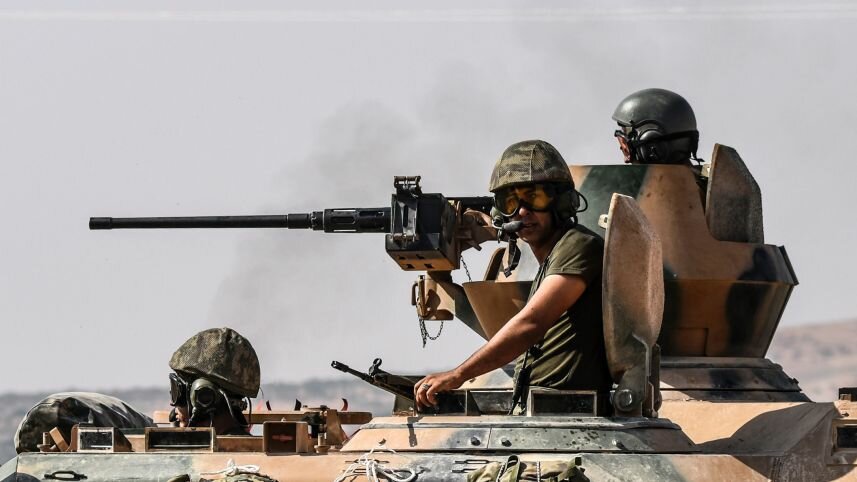While Turkish tanks, artillery and warplanes back Syrian rebels, the U.S. says it’s concerned the battle for territory has shifted away from targeting ISIS.

Turkish soldiers drive to Syria from the Turkish Syrian border city of Karkamis in the southern region of Gaziantep, Turkey, August 27, 2016. Bulent Kilic, AFP
REUTERS – Turkish-backed Syrian rebels pushed deeper into northern Syria on Monday and drew a rebuke from NATO ally the United States, which said it was concerned the battle for territory had shifted away from targeting ISIS.
At the start of Turkey’s now almost week-long cross-border offensive, Turkish tanks, artillery and warplanes provided Syrian rebel allies the firepower to swiftly capture the Syrian frontier town of Jarablus from ISIS militants.
Since then, Turkish forces have mainly pushed into areas controlled by forces aligned to the Syrian Democratic Forces, a coalition that encompasses the Kurdish YPG militia and which has been backed by Washington to fight the jihadists.
A group monitoring the tangled, five-year-old conflict in Syria said 41 people were killed by Turkish airstrikes as Turkish forces pushed south on Sunday. Turkey denied there were any civilian deaths, saying 25 Kurdish militants were killed.
“We want to make clear that we find these clashes – in areas where ISIL is not located – unacceptable and a source of deep concern,” said Brett McGurk, U.S special envoy for the fight against ISIS, using an acronym for the jihadists.
“We call on all armed actors to stand down,” he wrote on his official Twitter account, citing a statement from the U.S. Department of Defense.
Turkey, which is battling a Kurdish insurgency on its soil, has said its campaign has a dual goal of “cleansing” the region of ISIS and stopping Kurdish forces filling the void and extending the area they control near Turkey’s border.
That puts Ankara at odds with Washington and adds to tensions when Turkey’s government is still reeling from last month’s failed coup, which it says Washington was too slow to condemn. U.S. Vice President Joe Biden sought to patch up ties in a visit last week, just as Turkish forces entered Syria.
‘Ethnic cleansing’
On Monday, Turkish-backed forces advanced on Manbij, a city about 30 kilometers (20 miles) south of Turkey’s border captured this month by the SDF, in which Kurdish fighters play a major part, with U.S. help. The thud of artillery was heard in the Turkish border town of Karkamis.
SDF-aligned militia said they were reinforcing Manbij but insisted none of the troops in the region or the extra fighters heading to the city were from the Syrian Kurdish YPG militia.
Turkey has said its warplanes and artillery have bombarded positions held by the Kurdish YPG militia in recent days. It accuses the YPG of seeking to take territory where there has not traditionally been a strong Kurdish ethnic contingent.
“The YPG is engaged in ethnic cleansing, they are placing who they want to in those places,” Turkish Foreign Minister Mevlut Cavusoglu told a news conference in Ankara, demanding Kurdish forces withdraw east of the Euphrates river, a natural boundary with areas of eastern Syria under Kurdish control.
The YPG, a powerful Syrian Kurdish militia in the SDF that Washington sees as a reliable ally against jihadists in the Syrian conflict, have dismissed the Turkish allegation and say any forces west of the Euphrates have long since left.
“Turkey’s claims that it is fighting the YPG west of the Euphrates have no basis in truth and are merely flimsy pretexts to widen its occupation of Syrian land,” Redur Xelil, chief spokesman for the Syrian Kurdish YPG militia, told Reuters.
U.S. Pentagon spokesman Peter Cook said the U.S. “reiterated our view that the YPG must cross back to the eastern side of the Euphrates and understand that has largely occurred.”
Turkish-backed forces say they have seized a string of villages south of Jarablus in a region controlled by groups aligned to the U.S.- and Kurdish-backed SDF. They also say they have taken a few places to the west in ISIS areas.
The Syrian Observatory for Human Rights, which monitors Syria’s conflict, said Turkey-backed rebels had managed to seize at least 11 villages in 48 hours, bringing the total to at least 21 villages in the south and west Jarablus countryside captured since 25 August.
Syria’s conflict began in 2011 as an uprising against President Bashar Assad. Since then it has drawn in regional states and world powers, with a proliferation of rival rebel groups, militias and jihadists adding to the complexity.





